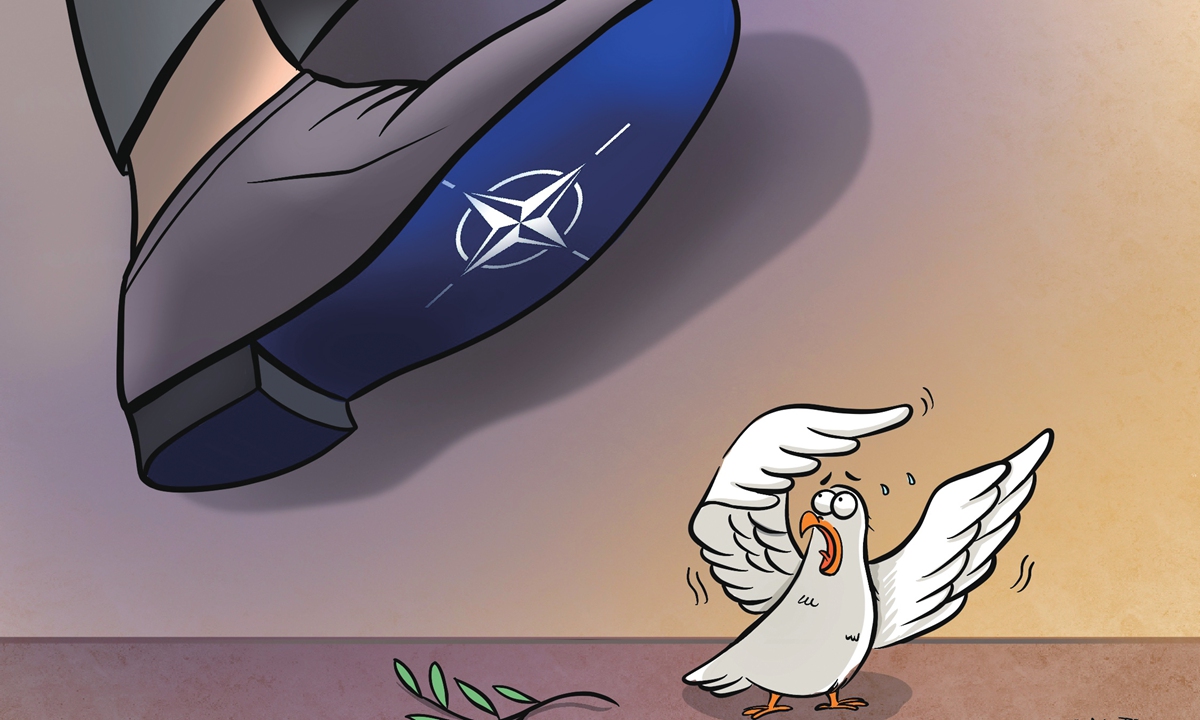
Illustration: Liu Xidan/GT
While NATO seeks to expand its global reach even further by proposing to open up a liaison office in Tokyo, French President Emmanuel Macron opposes that office: "If... we push NATO to enlarge the spectrum and the geography, we will make a big mistake," Financial Times quotes him as saying. When in China in April, he said it was no use following the US when it comes to its Taiwan stance in confrontation with China.
Most people will be surprised if they read NATO's Treaty document from its foundation in 1949. The document is built on the UN Charter, which states in the first article that peace shall be established by peaceful means; only after everything has been tried and proven in vain can the UN take military action under UN command (Chapter 7). NATO's Treaty emphasizes adherence to the UN Charter Art 51 about self-defense, and only for self-defense shall military means be used.
Further, it makes repeated reference only to the "North Atlantic area" to Europe and North America. It mentions only members - which have to be European - and the alliance shall refrain from the threat or use of force in any manner inconsistent with the purposes of the UN.
Now, what it does not mention but actively does today are things like these: military operations outside the territory of its members; military action for any other purpose than individual and collective self-defense; nuclear weapons and the storing of nukes on non-nuclear states' territory; nuclear first-use/strike even against a conventional attack; the category "partners"-it only mentions "members;" offensive deterrence-long-range offensive weapons, forward defense, forward deployment or pre-positioning of weapons, troops and ammunition.
NATO's fundamental legal obligation to adhere to the UN Charter is expressed in Article 1: "The Parties undertake, as set forth in the Charter of the United Nations, to settle any international dispute in which they may be involved by peaceful means in such a manner that international peace and security and justice are not endangered, and to refrain in their international relations from the threat or use of force in any manner inconsistent with the purposes of the United Nations."
In the preamble, the members reaffirm their "desire to live in peace with all peoples and all governments."
Of course, there is a distinction between what NATO does as a collective alliance and what single members do, what is a NATO military operation, and what is just, say, a coalition of the willing. But politically, the alliance, its summit, decisions, strategic concepts and agendas can not be separated.
It hardly requires a lawyer to see that today's NATO de jure and de facto operates a) way beyond or outside its treaty provisions and b) violate those provisions on a daily basis.
One example among many: NATO has invented a category called "partners." There are, thus, not only 31 members; there are 40 partners spread over all continents. NATO's homepage makes it extremely clear that partners are very close or almost-members: "In line with the 2010 Strategic Concept, NATO offered its partners 'more political engagement with the Alliance, and a substantial role in shaping strategy and decisions on NATO-led operations to which they contribute.'"
NATO policies rest on what could be called "the tyranny of small steps, of incrementalism." A small step leads to another (bigger) one, a structure is established, and then - it's so natural to take, calmly and systematically, another five-six steps and present it as a fait accompli to the gaping world.
That's how NATO has come to commit "out of area" operations like the bombing in Yugoslavia - to push its manifest destiny: Expansion - horizontal and vertical - to avoid what should have happened at the end of the Cold War when Russia and the Warsaw Pact dissolved: That NATO was put out business and raison d'etre and should have been closed down.
And although its Treaty mentions no "partners," it can now contemplate, as a most natural step, to establish an office in Tokyo, Japan - as part of leading NATO members' comprehensive military build-up in the Indo-Pacific directed against one of the US dual containment targets, China, while the transatlantic members in Europe target Russia as the other.
As with all incrementalism and out-of-treaty operations, a day will come when you hit the wall. Ukraine was such a wall, and NATO had been warned by high-level knowledgeable Westerners and all Russian presidents and foreign ministers the last 30 years.
Over 74 years, NATO has proven incapable of creating real peace. It is going global, out-of-area, and out-of-treaty. It no longer analyzes and argues. It postulates and preaches as does a Church of Militarism to the congregation.
Simple dialectics tell that the ever-expanding provocative alliance will create ever more conflicts not only with the Orient and Global South but also internally.
NATO is dysfunctional and irrelevant in the emerging cooperative multi-polar world.
Drinking more won't help an alcoholic cure his alcoholism. Arming and expanding more and more will not cure NATO's militarism. Therefore, on this point, at least, Macron is right.
A legal entity must respect its own laws or be closed down. NATO has no legal business outside its members in the transatlantic region.
The author is the director of the Sweden-based think tank Transnational Foundation for Peace & Future Research. He can be reached at TFF@transnational.org.




